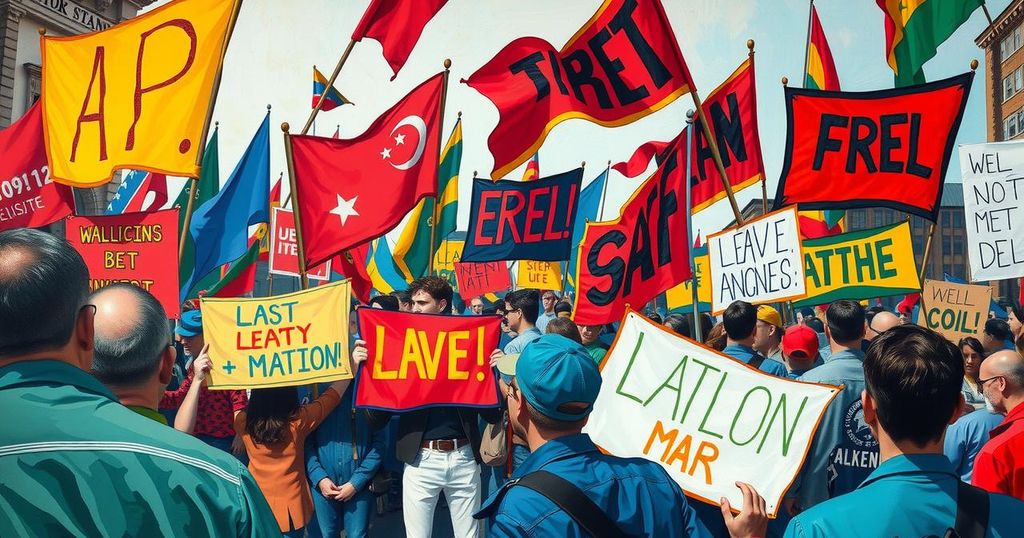Protests Against Trump Heighten Tensions in Political Arena
Protests against Trump’s mass deportations are rising, influencing his presidency and future elections. The White House intensifies drama in Los Angeles, with Trump adopting an aggressive stance. Democrats, particularly Gavin Newsom, look to counter this momentum but risk losing moderates. The situation raises concerns about constitutional boundaries, while Trump’s tactics evoke his base’s support. Overall, a volatile political landscape unfolds ahead of the 2024 elections.
In the wake of Donald Trump’s mass deportation strategy, protests are bubbling up across the nation, shaping not just his presidency, but the future of elections and the careers of Democrats. The White House seems to be endlessly escalating tensions, particularly in Los Angeles, where Trump’s militaristic approach underscores his desire to appear strong and consolidate power further. Meanwhile, Democrats struggle to find their footing in an unpredictable political landscape, desperately recalling their 2024 defeat and looking for ways to mount a real challenge against Trump’s relentless shock tactics.
One notable figure stepping up is California Governor Gavin Newsom, who is increasingly seen as a key champion in this ongoing saga, aiming for a presidential bid in 2028. But the path is fraught with risk, as Democrats have a base itching for action but must tread carefully to avoid alienating moderates who have previously turned their backs in the last election. The White House might see the protests as an opportunity to box in Democrats politically, but Trump’s inflammatory rhetoric could spiral out of control, leading to violence that may further blur the lines of accountability.
The tone from the White House is sharp and confrontational. White House press secretary Karoline Leavitt, for example, has accused Democrats of siding with “illegal alien criminals” rather than supporting law enforcement. This rhetoric seeks not only to undermine the humanity of those affected by deportation but also to recapture a narrative that elevates police support and portrays Democrats as anti-American. Leavitt claimed these protests weren’t just against law enforcement but rather a threat to American culture itself, framing Trump as a defender of order in chaotic times.
As the rhetoric heightens, the goal seems to be twofold: to vilify the protesters and to reinforce the use of military force in Trump’s immigration efforts. Some prominent Republicans, like Senator Tom Cotton, are echoing calls for aggressive measures against protesters and emphasizing the need to enforce immigration laws to protect society from perceived threats. With the deployment of thousands of troops to Los Angeles, Trump’s tough stance thrives on invoking a sense of urgency and crisis, even if it risks crossing constitutional lines into dangerous territory.
So does this aggressive strategy resonate? Well, if Trump can effectively convince the public of a dire situation, he might gain the support needed to justify unprecedented military actions on home soil. His base has historically reacted well to brazen language and hardline tactics, with high cheers for his most contentious comments. However, there’s a significant gamble here; escalating tensions might lead to tragedies that could irrevocably undermine Trump’s credibility. After all, he previously faced backlash over his handling of the pandemic, proving that a lost public confidence can be hard to restore.
Recent polling shows some support for deportations, but there’s also a clear line; many Americans are likely to recoil when friends or neighbours get caught in the dragnet. During his first term, the backlash to the zero-tolerance policy which separated families created an uproar. This time around, another unforgiving narrative or image of cruelty could easily sway public sentiment against him.
Amidst this turbulent environment, Democrats appear adrift without a unifying figure. Newsom’s recent address aimed to bolster morale for a party that’s still recovering from past defeats and Trump’s ongoing assaults on liberal values. As potential candidates for the 2028 election ponder their strategies, it’s a balancing act: need to energize the base while capturing support from moderates weary of controversy.
With previous movements like Black Lives Matter serving as reminders, Democrats must be wary of extremist reactions that could alienate wider voters. Calls for extreme action from within the party could repeat historical mistakes and provoke significant political fallout. And while warnings about potential threats to democracy from Trump may not resonate now, it is a precarious path for those hoping to dethrone him, especially as they navigate the fallout of his latest power plays.
As protests escalated against Trump’s immigration policies, both parties are wrestling with complex political realities. The Democrats face a dual challenge: energising their base while not alienating moderate voters. Meanwhile, Trump’s aggressive tactics cultivate fears and pushback. With critical voices like Newsom rising, the political landscape for 2024 remains absolutely uncertain, revealing ongoing struggles with identity, strategy, and messages in a polarized electorate.
Original Source: www.cnn.com
